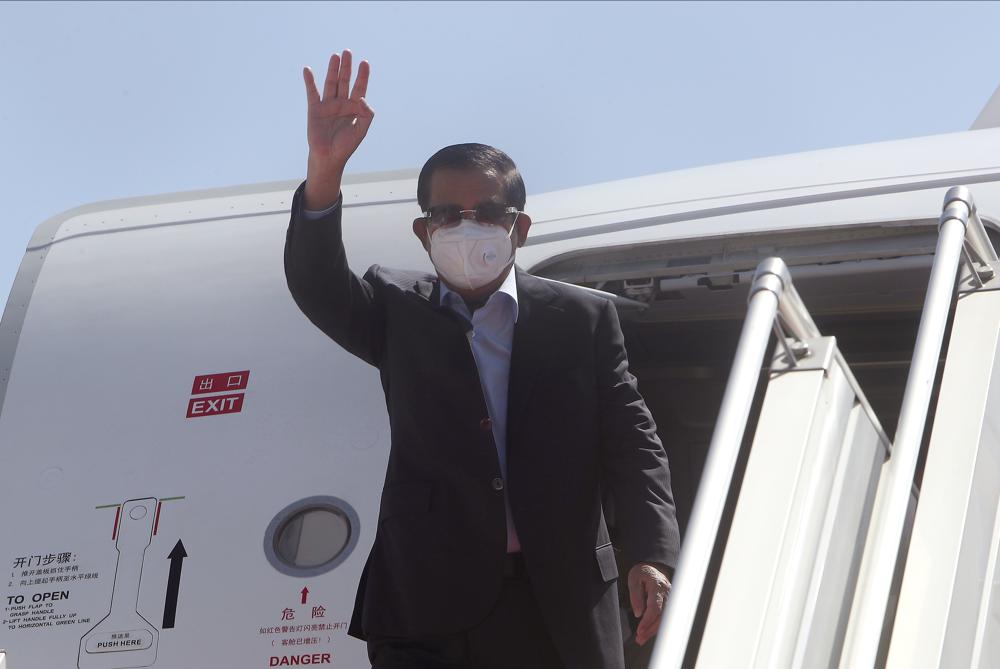Cambodia’s foreign minister on Saturday defended Prime Minister Hun Sen’s trip to Myanmar, the first by a foreign leader since the military takeover last year plunged the country into turmoil, though there was little evidence the mission yielded any immediate breakthrough.
Foreign Minister Prak Sokhonn told reporters that talks between Hun Sen and Myanmar’s leader achieved “a very good, positive result with a progressive step forward” on the implementation of peace efforts agreed to by the Association of Southeast Asian Nations, a regional bloc currently led by Cambodia.
Hun Sen’s meeting on Friday with Myanmar’s military chief, Senior Gen. Min Aung Hlaing, who overthrew the elected government of Aung San Suu Kyi last February, triggered protests in Myanmar and criticism abroad. Opponents said it legitimized the military takeover and broke the generals’ near-total diplomatic isolation.
The military’s seizure of power has led to widespread conflict with civilians forming guerrilla groups and thousands of people driven from their homes by army offensives.
“If there is anyone who opposes progressing these negotiations and the agreements like this, it is only those people who love war, those people who do not want to see Myanmar return to stability and peace,” Prak Sokhonn, who is also ASEAN’s special envoy to Myanmar, told reporters after returning home with Hun Sen from the 24-hour trip.
Friday’s joint statement on the talks, which described them as “frank and candid,” said Min Aung Hlaing was extending a cease-fire until the end of the year, and that both leaders would push for a meeting of stakeholders on delivering humanitarian aid.
The cease-fire offer is unlikely to be taken seriously by the military’s opponents. Such arrangements are routinely broken in Myanmar. The cease-fire also specifically referred only to long-standing ethnic armed groups, not the new civilian guerrilla units that are currently doing most of the fighting.
Prak Sokhonn also disclosed that Hun Sen brought up the case of Australian Sean Turnell, a former economic adviser to Suu Kyi who is on trial in Myanmar on charges of violating state secrets. He said that Hun Sen raised the matter at the request of Australian Foreign Minister Marise Payne.
“Hun Sen raised the issue with Min Aung Hlaing directly and he responded that the case is now before the court but he said that once it is completed, the senior general will consider the case. That means he promised that he would get back to Hun Sen with positive news,” Prak Sokhonn said.
Last April, ASEAN leaders, including Min Aung Hlaing, agreed on a five-point roadmap toward a peaceful settlement of the Myanmar crisis, including an end to violence and a political dialogue among all stakeholders.
The Myanmar leader was barred in October from attending ASEAN meetings after the group’s special envoy was prevented from meeting with Suu Kyi and other political detainees, which was one of the stipulations of the agreement.
Myanmar’s military said Hun Sen would not be allowed to meet with Suu Kyi, who was convicted in December on charges of incitement and violating coronavirus restrictions and sentenced to four years in prison — a sentence that Min Aung Hlaing then cut in half.
She is also facing a string of other charges.
The Myanmar military has a history of bloodshed, including a brutal campaign against the Rohingya Muslim minority. Its seizure of power provoked nationwide nonviolent demonstrations, which security forces have quashed with deadly force.
The military has recently engaged in violent suppression of all dissent, disappearances, torture and extrajudicial killings. It has also launched airstrikes and ground offensives against ethnic armed rebel groups.
Security forces have killed about 1,443 civilians, according to a detailed tally by the Assistance Association for Political Prisoners. As the crackdown has become more severe, an armed resistance has grown inside the country.
(AP)











